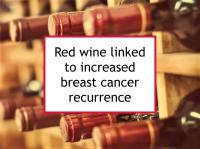Red wine has some favorable characteristics that have caused some to conclude that it might be beneficial, or at least safe, for breast cancer patients and survivors. Red wine can inhibit aromatase, the production of estrogens from androgens within the body. It has also been shown to help inhibit the breast cancer development in mice.
However, alcohol (including red wine) intake has been found to be associated with increased risk of breast cancer in population studies (see the alcohol webpage).
Effects of red wine polyphenols on breast cancer
Like grapes, red wine is an excellent source of resveratrol, other polyphenols, and oligosaccharides that have been shown to counteract the development of breast cancer. Resveratrol has the ability to suppress proliferation of breast cancer cells and promote cell death, as well as inhibiting aromatase, which is important for reducing growth-stimulatory effects in estrogen-dependent (ER+) breast cancer. Red wine components have been shown to inhibit colony formation of breast cancer cells in the laboratory.
Red wine linked to increased risk of breast cancer
Alcohol consumption is positively correlated with breast cancer risk, particularly hormone receptor positive (ER+/PR+) and lobular breast cancer. The association between alcohol intake and increased breast cancer risk is strongest in postmenopausal women.
Most studies that have separated the effects of wine or red wine on breast cancer risk from that of other types of alcoholic beverages have reported no or little preferential benefit from wine drinking compared to other alcoholic beverages. However, there is some indication that modest red wine drinking might serve to prevent breast cancer to a limited extent; this benefit is extinguished once intake exceeds a low threshold.
For example, one meta-analysis of data from 26 previous studies reported that women with the highest alcohol intake (generally those in the highest quartile or tertile of intake) had a 36% higher risk of breast cancer compared to those with the lowest. The same meta-analysis reported that 5 grams per day of ethanol from wine (less than 2 fluid ounces of wine) appeared to have protective value.
Red wine linked to increased breast cancer recurrence
Alcohol has also been shown to increase risk of recurrence in breast cancer survivors. One major prospective study, which included 1,897 breast cancer patients from Kaiser Permanente Northern California, reported that moderate alcohol consumption was associated with increased breast cancer recurrence. The majority of the women (89%) drank wine. Compared with abstinence from alcohol, drinking at least 6 g/day of alcohol was found to be associated with 1.35 times the risk of breast cancer recurrence. The risk of recurrence was higher among postmenopausal and overweight women. The authors concluded that consuming three to four alcoholic drinks or more per week after a breast cancer diagnosis may increase risk of breast cancer recurrence.
Alcohol reduces the treatment effects of tamoxifen
Wine and other alcohol consumption has been shown to reduce the beneficial treatment effects of tamoxifen. Please see our article on tamoxifen and alcohol for more information.
How much red wine is safe for breast cancer survivors?
For breast cancer patients, those in remission and those at high risk for breast cancer, the cancer-promoting properties of red wine outweigh its potential benefits (including preventing cardiovascular disease) for the most part. Drinking purple grape juice or non-alcoholic wine and using red wine in cooking is preferable to drinking red wine. Based on the available evidence to date, up to one glass of red wine every third day with food appears to be a safe level of consumption. Alcohol should be avoided during tamoxifen treatment.
Below are links to 20 studies concerning this topic. For a more complete list of studies, please click on alcohol.
